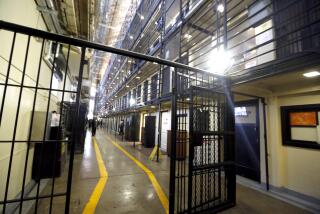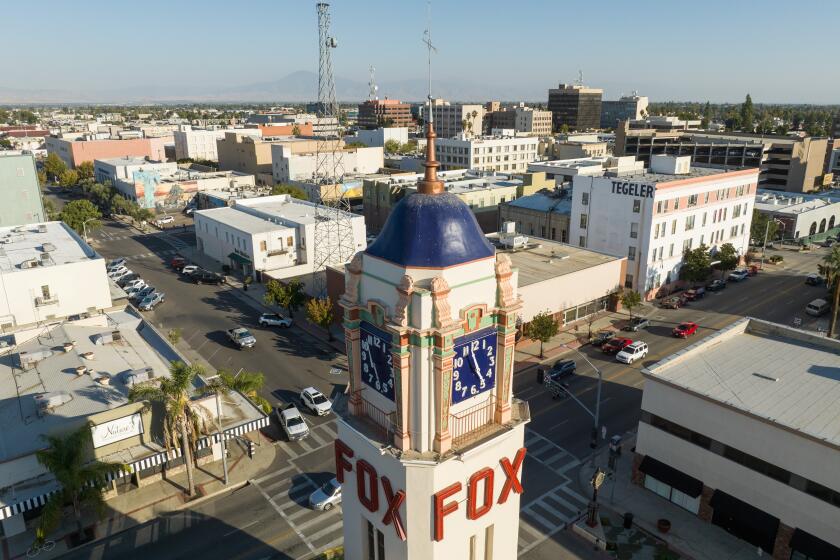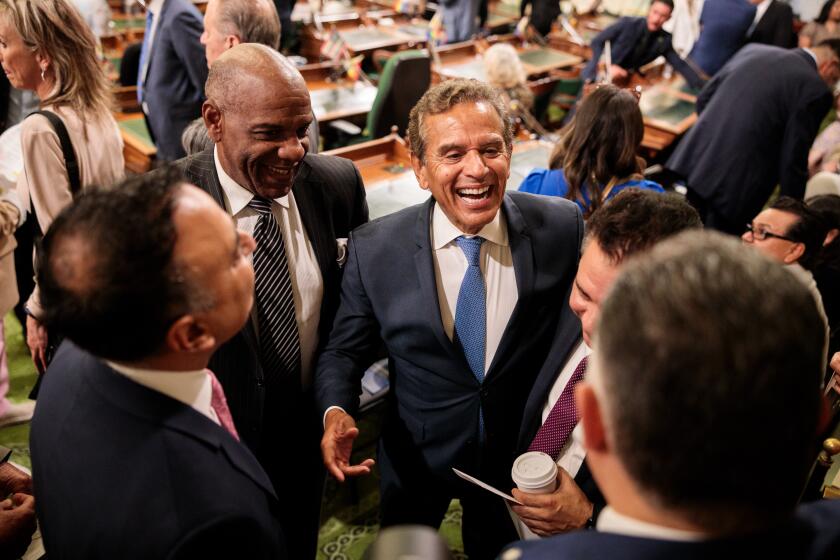Voters back Gov. Brown’s plan for prisons
SACRAMENTO – Gov. Jerry Brown’s latest plan to cut the prison population has wide support among California voters, who view rehabilitation as a key way to address overcrowding in state lockups, according to a new USC Dornsife/Los Angeles Times poll.
Federal judges have ordered Brown to reduce inmate numbers in the coming months, and the governor recently asked them for three extra years to do so. Under Brown’s plan, the state would use that time to expand mental health and drug treatment programs, in hopes of reducing the high number of offenders who serve their time but then commit new crimes and return to prison.
The judges recently granted the state a one-month reprieve, but if they do not agree to a longer delay, officials will have to rid the prisons of about 9,600 inmates. In that case, Brown proposes to move thousands to privately owned prisons, county jails and other detention facilities.
Fifty-eight percent of registered voters surveyed said they backed Brown’s plan, the product of a compromise with Senate leader Darrell Steinberg (D-Sacramento), who sought a greater focus on rehabilitation. Thirty-two percent were opposed. Although support was stronger among Democrats, 51% of Republicans were also in favor.
The top choice among several options for reducing inmate numbers was expanding rehabilitation programs, with 26% selecting it as their first preference. Building additional prisons and paying to house inmates in private facilities were voters’ least-favorite choices.
“They look at building more prisons as treating the symptoms instead of treating the disease,” said Dave Kanevsky of American Viewpoint. “That’s why you see the preference to some of these rehab options.”
California has struggled with a revolving door in its criminal justice system — nearly two-thirds of inmates are back behind bars within three years of their release, according to a state report in 2011.
The poll was conducted jointly by American Viewpoint, a Republican firm, and Greenberg Quinlan Rosner Research, a Democratic company, for the USC Dornsife College of Letters, Arts and Sciences and the Los Angeles Times. They surveyed 1,500 registered state voters by telephone Sept. 18-24. The margin of error is plus or minus 2.9 percentage points.
California’s prison system has been under court scrutiny for decades. In 2009, the federal judges ordered the state to cut its prison population because overcrowding was preventing inmates from receiving adequate medical care. That caused unnecessary deaths and created unconstitutional conditions behind bars, the judges said.
Brown has tried to address the issue for the past two years by keeping low-level offenders in county jails instead of sending them to state prisons, but that hasn’t been enough to satisfy the court.
The judges have prodded the state to consider options such as the early release of low-level, nonviolent offenders. Brown and lawmakers have rejected that approach, but the poll indicates voters are open to such steps.
Respondents chose reducing sentences for minor crimes and releasing low-level, nonviolent offenders as the best options for cutting crowding, after rehabilitation services.
The clear preference for more rehabilitation programs reflects “a broadly held belief that this can help,” said Drew Lieberman of Greenberg Quinlan Rosner. Voters feel “this can be part of a long-term, sustainable solution.”
Christine Westfall, a Democrat from Susanville who participated in the poll, said the state should offer more services to help people like her son, who spent time in prison years ago.
“He got away from the meth, finally, but since then it’s been alcohol,” she said. “I tried last year to get my son into rehab. There’s no money for it. And I can’t afford it.”
Westfall, 65, said she could vouch for the value of rehabilitation — she struggled with drinking herself before finally getting sober.
Others had little faith in treatment programs.
“It’s a Democratic, feel-good pack of nonsense,” said David Schieber, a retired police officer and Republican who lives in San Luis Obispo County. “Prisons are places of punishment, not rehabilitation.”
Schieber, 69, strongly opposes reducing sentences or discharging any prisoners early.
“Any time a crook is on the street, you and I are at risk for something happening to us,” he said. “You think a thief is going to stop stealing? You think a dope addict is going to stop using dope?”
California has already backed away from some tough-on-crime measures.
Last year, voters approved a ballot initiative that softened the state’s precedent-setting “three strikes” law by reducing the number of offenders who automatically qualify for harsh sentences and allowing some already in prison to petition for earlier release.
More to Read
Start your day right
Sign up for Essential California for news, features and recommendations from the L.A. Times and beyond in your inbox six days a week.
You may occasionally receive promotional content from the Los Angeles Times.







